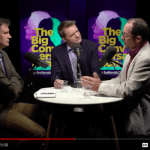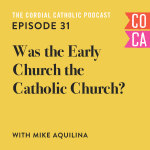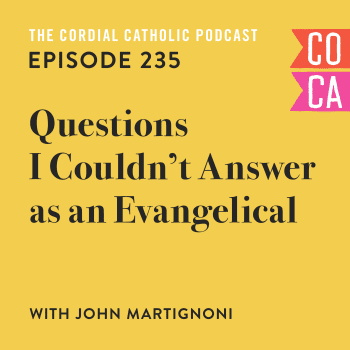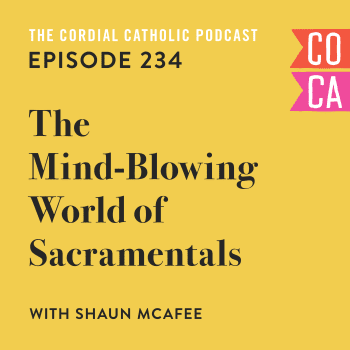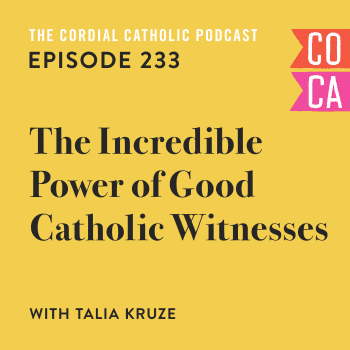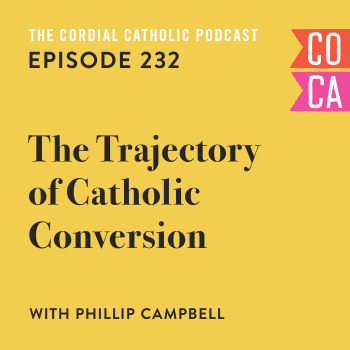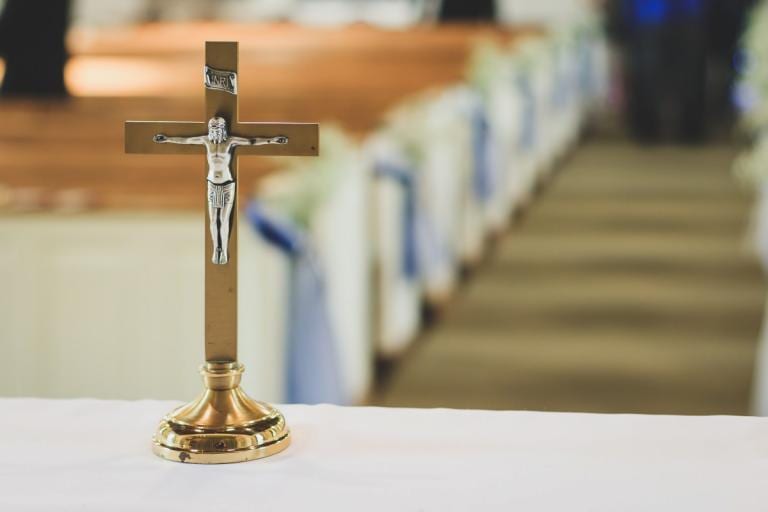
I was a very happy, mostly holy, evangelical Christian when I began to dig into the roots of my Christian faith.
It began honestly enough when the pastor of a non-denominational church I was working for asked me a question about which came first, Scripture or Tradition. I was surprised, quite frankly, when my research to try and find the answer led me to the historical development, the creation, of the biblical canon. I was surprised to learn that the Bible didn’t just fall, intact, from the sky but was compiled, collected together, by the Early Church over the course of several hundreds year.
I was shocked to learn that it was through things called church councils that these early Christians decided which books belonged in the Bible and which didn’t. I was nothing short of scandalized to learn that the people making these decisions had titles like “bishop” and traced their own authority back to the apostles appointed by Christ. I learned that this was called Apostolic Tradition and that along with this claim to authority these very early Christians who collected together the Bible also believed in infant baptism, praying to the saints, collecting and honouring relics, and that Jesus was really present in the elements of Communion—that it really was His body and blood—and they celebrated this every time they got together.
To say my mind was blown would be to put it mildly.
It was digging into the history of my Christian faith, its roots and rituals, that what felt like scales began to fall from my eyes. Other than being chief amongst the sinners I am in no way similar to the Apostle Paul but my experience here feels at least a little bit similar to his. Here I was practising a faith I thought was the complete revelation of God only to discover I’d been missing out on two thousands years of Tradition.
So, eventually, I became Catholic. And everything changed.
With all of this in mind, here are three things I think all of our evangelical friends and family should know, what I wish someone had told me, about the Catholic Church.
There’s Another Way to Read the Bible
One of the greatest difficulties I had as a non-denominational, evangelical Christian was trying to figure out my theology.
I know I’m not alone. I get e-mails and comments from non-Catholic Christians all the time expressing the same challenges; I’ve spoken to so many people who say the same thing.
So, it was the most welcome breath of fresh air to find out that the way I was trying to wrestle with the Scriptures wasn’t the only way to do it. In fact, it wasn’t even the way the authors of the New Testament ever intended.
As an evangelical Christian I was often left to my own devices when it came to understanding how to read, interpret, and practice the principles of New Testament Christianity. As anyone with any experience in the Protestant world knows there thousands of different denominations with thousands of different interpretations of what the Bible says. And, shockingly, they don’t just disagree on small issues of aesthetics or minor points of theology. We’re taking major theological concepts like how we’re saved, what baptism is, and the definition of Christian marriage.
No small potatoes.
I’d read my Bible and academics texts written by theologians and listen to my pastor on a Sunday morning and try to unpack issues in small group Bible studies but it seemed like, so many times, I would run into a wall. A wall of, “Well then how come that church over there believes something different? Are they just not reading their Bible right?”
But they could say the very same thing about us. And it wasn’t like we all weren’t trying really hard.
What I learned, as I began to understand what Catholics taught about the Bible, is that from the beginning of Christianity, the Church has taught a way of understanding the Scriptures that was radically different than mine.
Instead of each person interpreting the Bible for themselves, the Catholic Church has always taught that it should be understood in the light of Tradition, of what the Church has always taught and continues to teach, and that it can be authoritatively interpreted by this same Church. In other words, the Catholic Church traces its ancestry all the way back to when Jesus gave Peter and the apostles the authority to “bind and loose.”
This binding and loosing still applies today and on difficult, challenging matters like the sorts of things I was wrestling with as an evangelical, the Catholic Church believes it can authoritatively speak to settle them.
When I understood that it all clicked into place. Of course Jesus wouldn’t leave us to sort it all out for ourselves; any written rule needs interpretation and Jesus left a Church with the authority to interpret.
And what our evangelical friends need to know is that to those that have become burnt out, who’ve run into the same walls that I found myself kicking against, there is another way. Before you jettison the Bible and everything you’ve learned in your faith journey so far, consider this: that Christ didn’t just leave us with a Bible, he also left a Church.
Catholic Rites and Rituals Have Deep, Deep Roots
Long before I ever considered becoming Catholic, years before that evangelical pastor asked that fateful question about Scripture and Tradition, I wrote a blog article about the Catholic Mass.
Mind you, I had never actually been to a Catholic Mass. I, honestly, had no idea what even took place there but one thing that I knew for sure: It all happened for a reason.
I was, at the time, wondering exactly why my non-denominational, evangelical church structured its Sunday worship services in the way that it did. Why did we have worship music and then prayer and then a sermon, and communion once a month. I wondered what the roots of this tradition was because I couldn’t find it in the Bible. Sure, as we all know, the “breaking of bread” and the “singing of hymns” and praying together is all mentioned when the disciples get together in Acts but when did this all become codified into what my Sunday morning service looked like.
I didn’t know. I couldn’t tell. And those around me, trusted pastors and mentors, couldn’t really put words to it either. It was, so I was told, just what we’ve always done.
On the other hand there was the Mass.
The rituals, the rites, the formulaic written prayers and acclamations of the Catholic Mass, I knew even then, were deeply rooted in history. There was a purpose to every small action whether standing or sitting or kneeling. There was a reason, a root, a grounding if you will, to something deeply more.
Years later, when I began to explore the Catholic Mass and some of the traditions of Catholicism I was gobsmacked to find out how deep those roots went.
It turns out that a lot of the misconceptions and misunderstandings I had about Catholics were actually about things which had very deep traditional, biblical, and historical roots—these things were deeply grounded in very pointed purpose and intention. This stuff wasn’t invented overnight.
Practices like praying for help from Mary and the saints which, I thought, was nothing short of idolatrous, had been around since the beginning of Christianity—I learned that all Christians used to do this sort of thing. It was the same for the priesthood, Apostolic Succession, the idea of a Pope and purgatory and even, I learned, the very structure of the Catholic Mass, parts of which appear in great detail in an ancient document called the Didache dating to the time of the apostles.
To my surprise, the idea that the Catholic Church added all these weird rituals and rites to the simple Christian message of faith was wrong. It was backward. As a non-denominational evangelical my practice of the faith, much like my experience on Sunday mornings, had simply been stripped of its roots. We’d forgotten our heritage and the Church which, through its authority, had compiled and collected the books of the Bible also practiced all of these rituals and rites, too.
Rites and rituals with deep, deep roots.
You Can Consume Christ
Finally, and most shocking, was the discovery of the Catholic belief in the Real Presence.
Sadly, I can no longer pinpoint the exact time or place or means by which I first came to realize what the Catholic Church taught about the Eucharist but I know it completely shock my world. To think, as Catholics do, that when we consume the communion elements we are really and truly consuming Christ is an absolute scandal. A scandal, in fact, which caused persecutors of the Early Church to condemn Christians as “cannibals.”
Yes, that Early Church.
Because the most shocking discovery out of everything I learned as I began to dig into the roots of Christianity, was that even the very first Christians believe that Jesus was really and truly present in the elements of communion.
Today, the Catholic Church refers to this understanding as transubstantiation which means that the bread and wine become Jesus in everything but their appearance. As Catholics we consume Christ, “body, soul, blood, and divinity” under a kind of miracle that joins us to Jesus’ Last Supper and death on the cross. A kind of cosmic, time-bending experience that re-presents Christ crucified for our sins.
In short, we consume Christ to become more like Christ and receive God’s grace.
You can imagine my surprise, as a non-denominational, evangelical Christian to discover a closeness with God that I could never imagine.
For me, it was nothing short of a re-definition of my faith. God did not come, dwell among us, die and return to Heaven. He didn’t just send the Holy Spirit to dwell in and amongst us as a kind of spiritual conselor and consoler. He also established a new covenant which, as we celebrate it every week, is an actual giving of himself and a taking into ourselves, a partaking in a small way of the beautiful mystery of the life of God.
Bit by bit conforming us to be more like Christ.
And this is what the Church believed from the beginning, what was taught by the apostles, we know, because we have documents written by those they taught. What was practiced, we know, because we have records of their practice. And what, as a non-denominational evangelical Christian, I simply had to be a part of: a closeness to Christ I could never, ever have imagined.
A story which must be real, because you can’t make this stuff up.
In the end, there are lousy Catholics, this you need to know. As an evangelical with a faith on fire and a deep love for the Scriptures I considered many Catholics that I met to hardly be Christians at all. This was often discouraging in my journey. There is, to be sure, a kind of cultural Catholicism which also has deep roots but this doesn’t mean, for a second, that the faith is not alive, vibrant, and utterly soaked in the grace of God.
Believe me, it is, and as someone who has been there and, now, is somewhere so different I hope that these three things can help shed some light because if there’s anything I know for sure it’s that once those scales began to fall from my eyes, once I understood what the Catholic Church really taught and really believed, well, like Peter said, “Where else can I go, Lord?”

